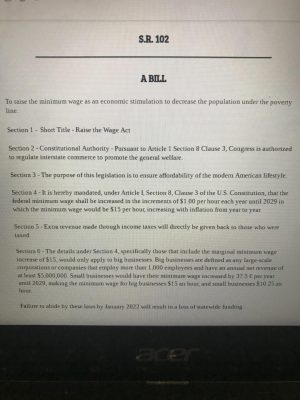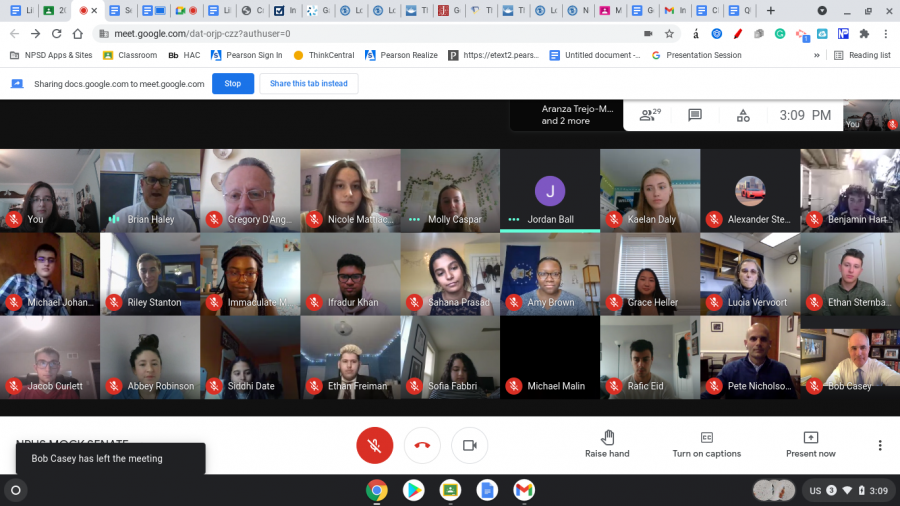Civics, Civility, and Committees on display in first ever Mock Senate
2021 has seen the United States Senate split 50-50 for just the fourth time in history. Last month, the Senate voted along party lines to barely pass the $1.9 trillion stimulus package. Needless to say, D.C. has seen more bipartisan eras. So, in the spirit of wanting to “be more productive than the real Senate”, a trio of North Penn High School students set out to do just that.
Seniors Catherine Cavanaugh and Riley Stanton and Junior Grace Heller came up with the idea to give interested students a chance to experience the legislative process as part of a Mock Senate.
“Grace said ‘hey, I want to do a fundraiser between political clubs, because we have a lot of problems.’ Not necessarily in the school…it’s more of this national dialogue that we seem not wiling to have constructively. So, because there was so much hate in the 2020 election, because the parties are drifting further apart, one of the things everyone can come together and decide to do is support a charity. It was Grace’s idea to choose the Ronald McDonald House,” Cavanaugh explained.
They took their basic outline to NPHS Government teacher Brian Haley, and he was hooked.
“Of course, a Mock Senate is right in my wheelhouse, so I thought ‘That’s awesome! I’d be happy to help out.’ They came to me with most of the details already in their heads, they were just trying to figure out how to make it work,” Haley said.
Cavanaugh, Stanton, and Heller each crafted 2-5 ‘bare bones’ versions of bills, with the intention for the committees to bulk up the bill with provisions and amendments. The first half of the Mock Senate took place amongst 3 breakout rooms, each of which acted as a committee with approximately 10 Senators.
Each committee debated 3 bills, and each ended up voting to move 2 of their bills to the full Senate floor. The bills were intentionally created around controversial or constitutionally questionable issues, which sparked more substantive and in-depth debates.
“We had one part limiting the amount of money that Super-PACs could get [which goes against Citizens United v. FEC], we had the birthright tourism ban, so we created definite problems that these students had to identify and use their knowledge of the laws, and their sense of equity and fairness to try and parce out,” Cavanaugh explained.
“We passed 6 bills, [including] a resolution regarding the legalization and taxation of revenue from marijuana. We failed an immigration birth ban, passed a carbon tax, and passed raising the minimum wage (incrimentally to $15, small businesses to $10.25),” Cavanaugh continued.

Voter ID bill, which included expanding access to polls and requiring the government to issue Voter IDs to everyone, passed with a sizable majority, while other bills were much more similar to the recent patterns of the actual Senate.
“A number of the bills passed by literally one or two votes. It was that close,” Haley said.
The aim of the Mock Senate was to have a relatively even ideological split, but it did not take long to recognize that there was a clear lean to the left.
“Initially, they wanted to make them role play an actual senator. I talked them out of that because it would be too much work for the kids. So I said ‘maybe we can split them up based on their Party preference, and then divide them up among committees.’ As it turned out, more kids were leaning left, so on each committee we had folks that were more liberal than more conservative, so it didn’t quite balance out,” Haley noted.
The student organizers sent out a Google Form to participants in order to get an idea of who aligned themselves with which party, but some Senators not filling it out complicated the process.
“The difficult thing was, we asked people on the form ‘which party do you align with most?’ They would put a D or an R, or leave it blank. We tried to use that. Some kids didn’t fill out the form but showed up, and we treated them as Independents. If you slate a room for ten kids-let’s say 5 Democrats, 3 Republicans, and 2 kids who didn’t list-if you have any of the Republicans missing, we’re automatically down,” Cavanaugh said.
“Teenagers tend to lean farther left than people in their 30s or 40s, etc, just because of teenage priorities. We tried our best to spread it out and split it up as much as we could,” Cavanaugh added.
Party breakdown aside, Cavanaugh was impressed with the seriousness of the Mock Senators’ questioning and demeanor, describing them as “significantly less heated than the real Senate.”
“There were a series of deep questions that your typical 16 or 17 year old might not always be thinking of. So it was interesting, because this group of kids, they did this voluntarily. To donate money to the Ronald McDonald House and spend their Friday afternoon and evening, when it was actually nice out…they pretended to be Senators because they actually care about what is going on,” she continued.
There was one participant who didn’t have to pretend to be a Senator, because he is one! Pennsylvania Democratic Senator Bob Casey joined the Mock Senate during their afternoon session to discuss what it is really like to serve in office.
“Sen. Casey said that one of the most important things when you’re running for office is to know what you’re running for. The worst thing is when someone runs a campaign to run a campaign, and then they get in office and don’t know what they are doing or why they are there. He made it very clear that no matter what field you go into, public service is the most important thing we can do. Any way that you can help people is the best way you can do things,” Cavanaugh said.
“The bulk of what he talked about was relationships and the polarization of the climate, how you try to act as a Senator. He kind of admitted that it’s worse than it’s ever been in his lifetime. When his office asked me ‘what do you want to talk about?’, I said these kids need to hear about reality. About what it’s like to try and be successful as a Senator,” Haley said.
Cavanaugh and Stanton will graduate this June, but Heller and Haley plan to make Mock Senate a new NPHS tradition, hopefully even in-person next year.
“I’m pretty sure that this is going to be an ongoing thing. You meet a lot of teachers along the way, but Mr. Haley is completely…he’s just iridescent. His intentions are pure; he wants to get kids civically involved. As long as he’s here, he’s going to try and keep this going,” Cavanaugh noted.
As for what students took away?
“It was a good way for me to understand what goes into the bill-drafting process and talk about various political issues, especially since I don’t normally do this stuff, because I’m more STEM focused. It was great to expand my horizons,” senior Siddhi Date said.
“For me, it was the civics aspect of it. I wanted to give them an idea of just how difficult it is to write and pass laws. Everybody’s got great ideas of what they want to do, but formulating that into actual policy that can get passed in a legislative body is a lot harder than people think it is,” Haley added.
“Civics is going to be there whether you learn it or not,” Cavanaugh concluded. “So your best bet is to know it and know it now.”


